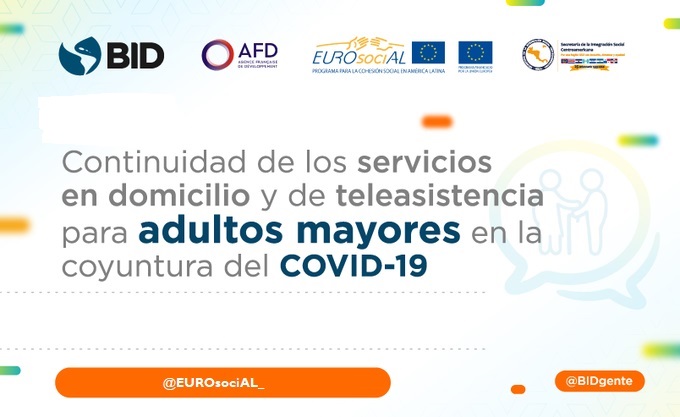In the framework of the cycle of exchanging experiences on care policies directed at dependent people during the pandemic, EUROsociAL+ organised a second webinar in collaboration with the Inter-American Development Bank (IDB), the French Development Agency and the Central American Secretariat for Social Integration (SISCA).

Caring for people with functional dependence at home, through home services or telecare, is a practice generally recommended for its positive effects in terms of the quality of life of the person being attended. Furthermore, in the context of care policies, it reduces pressure on the health sector and enables a better redistribution of resources in residential centres. However, in the current situation with the worldwide spread of the COVID-19 virus, these services are greatly affected by the risk of contagion to which both the people who are cared for and their care givers are exposed. For this reason, in some countries home care services have been reduced or even cancelled. How, therefore, can the continuity of home care services be guaranteed, avoiding the spread of contagion while enabling the physical and emotional well-being of those who are cared for? Can telecare services that have been generated in recent years to care for people with minor dependencies be part of efforts to guarantee care?
On this subject the European Union, through itsEUROsociAL+ programme, in collaboration with the Inter-American Development Bank (IDB), the French Development Agency (AFD) and the Central American Secretariat for Social Integration (SISCA), has organised the second webinar in the series dedicated to supporting Latin American countries and the Caribbean to mitigate the impact of COVID-19 on older people.
The webinar was attended by the Costa Rican Minister of Human Development and Social Inclusion, Juan Luis Bermúdez, the director of the National Care System in Uruguay, Daniel Radío and the Executive Director of the European Social Network, Alfonso Lara Montero.
Likewise, Elisa Mendoza, a specialist in Long-stay Centres in France, Octavio Vergara, director of the National Service for the Elderly in Chile and Beatriz García, from the Institute for Dignified Ageing in Mexico City, also took part. The webinar was moderated by Lourdes Bermejo García, an EUROsociAL expert and vice-president of the Spanish Society of Gerontology and Geriatrics.
All the presentations highlighted the actions taken by governments to quickly establish alternative mechanisms in the care of dependent people, focusing on agility, creativity and smooth interfaces between services, different areas of government and different actors in society. Likewise, they addressed future challenges as home and distance care services will only increase in the coming years.
The webinar tried to contribute to the exchange of experiences since similarities in the pandemic have been seen in all countries although over different time periods.



